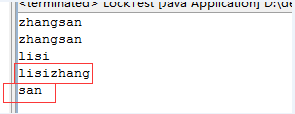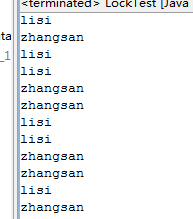java5 Lock用法
锁是控制多个线程对共享资源进行访问的工具。通常,锁提供了对共享资源的独占访问。一次只能有一个线程获得锁,对共享资源的所有访问都需要首先获得锁。不过,某些锁可能允许对共享资源并发访问,如 ReadWriteLock(维护了一对相关的锁,一个用于只读操作,另一个用于写入操作) 的读写锁。
1、Lock提供了无条件的、可轮询的、定时的、可中断的锁获取操作,所有加锁和解锁的方法都是显式的。
|
1
2
3
4
5
6
7
8
9
|
public
interface
Lock{
void
lock();
//加锁
//优先考虑响应中断,而不是响应锁定的普通获取或重入获取
void
lockInterruptibly()
throws
InterruptedException;
boolean
tryLock();
//可定时和可轮询的锁获取模式
boolean
tryLock(
long
timeout,TimeUnit unit)
throws
InterruptedException;
void
unlock();
//解锁
Condition newCondition();
}
|
2、ReentrantLock实现了lock接口,跟synchronized相比,ReentrantLock为处理不可用的锁提供了更多灵活性。
3、使用lock接口的规范形式要求在finally块中释放锁lock.unlock()。如果锁守护的代码在try块之外抛出了异常,它将永远不会被释放。
以下模拟Lock用法:假设有两个线程(A线程、B线程)去调用print(String name)方法,A线程负责打印'zhangsan'字符串,B线程负责打印'lisi'字符串。
1、当没有为print(String name)方法加上锁时,则会产生A线程还没有执行完毕,B线程已开始执行,那么打印出来的name就会出现如下问题。

2、当为print(String name)方法加上锁时,则会产生A执行完毕后,B线程才执行print(String name)方法,达到互斥或者说同步效果。

|
1
2
3
4
5
6
7
8
9
10
11
12
13
14
15
16
17
18
19
20
21
22
23
24
25
26
27
28
29
30
31
32
33
34
35
36
37
38
39
40
41
42
43
44
45
46
47
48
49
50
51
52
53
54
55
56
57
58
59
60
61
62
63
64
65
66
67
68
69
70
71
72
73
74
75
|
package
com.ljq.test.thread;
import
java.util.concurrent.locks.Lock;
import
java.util.concurrent.locks.ReentrantLock;
/**
* 用Lock替代synchronized
*
* @author Administrator
*
*/
public
class
LockTest {
public
static
void
main(String[] args) {
new
LockTest().init();
}
private
void
init() {
final
Outputer outputer =
new
Outputer();
//A线程
new
Thread(
new
Runnable() {
@Override
public
void
run() {
while
(
true
) {
try
{
Thread.sleep(
10
);
}
catch
(InterruptedException e) {
e.printStackTrace();
}
outputer.output(
"zhangsan"
);
}
}
}).start();
//B线程
new
Thread(
new
Runnable() {
@Override
public
void
run() {
while
(
true
) {
try
{
Thread.sleep(
10
);
}
catch
(InterruptedException e) {
e.printStackTrace();
}
outputer.output(
"lisi"
);
}
}
}).start();
}
static
class
Outputer {
Lock lock =
new
ReentrantLock();
/**
* 打印字符
*
* @param name
*/
public
void
output(String name) {
int
len = name.length();
lock.lock();
try
{
for
(
int
i =
0
; i < len; i++) {
System.out.print(name.charAt(i));
}
System.out.println();
}
finally
{
lock.unlock();
}
}
}
}
|





















 314
314

 被折叠的 条评论
为什么被折叠?
被折叠的 条评论
为什么被折叠?








